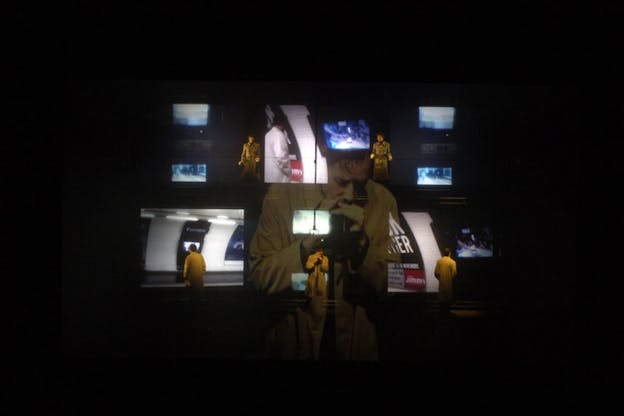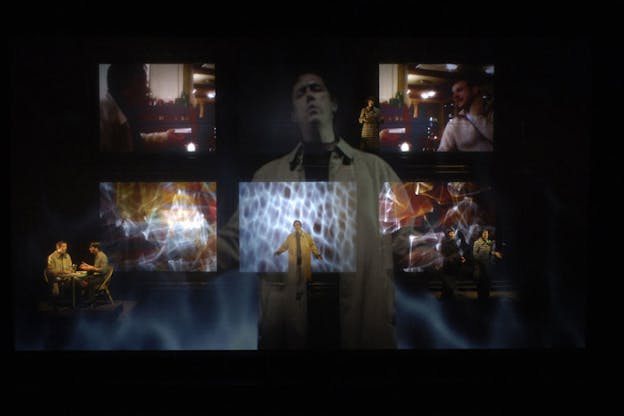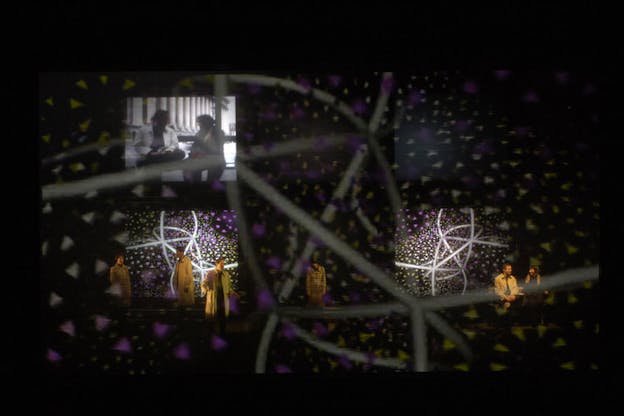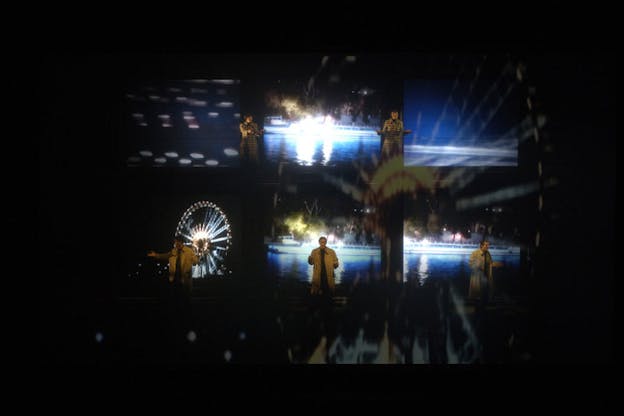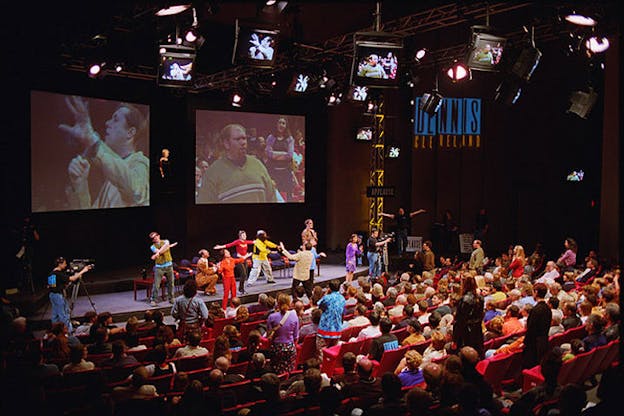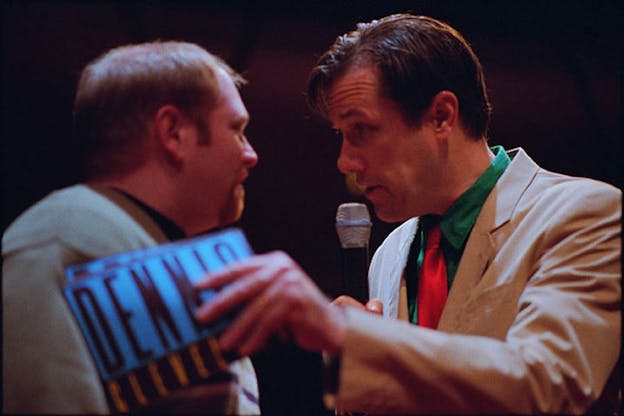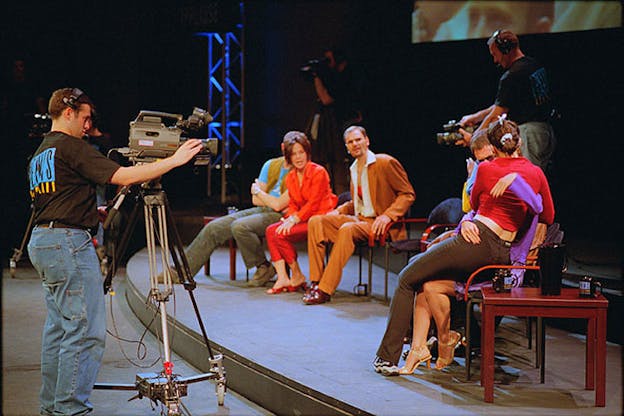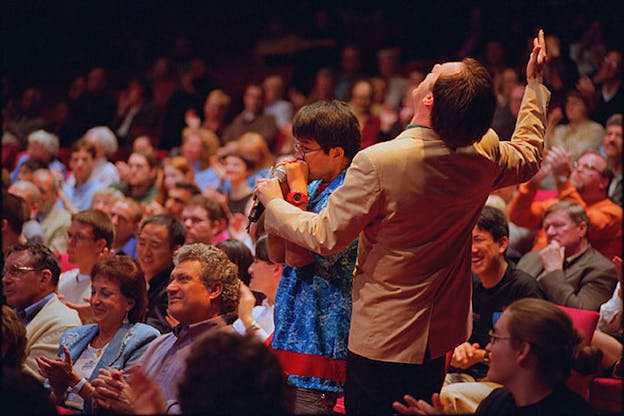Mikel Rouse
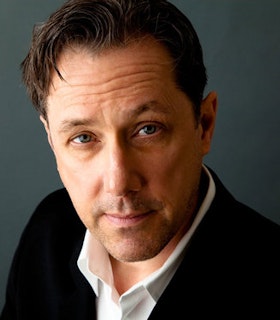
The grant afforded me to make real and significant changes in my work.
- Mikel Rouse, February 19, 2003
Artist Statement
The social/cultural context of my work can best be viewed through the 1996 opera Dennis Cleveland which I composed and directed. In this work, I attempt to explore the deeper underlying aspects of a society glued to the tube. After a lot of research I was led to the conclusion that the talk show ritual was simply a replacement of ceremony previously associated with religion. The themes of religion and social order are also prevalent in the operas Failing Kansas, inspired by Truman Capote's In Cold Blood, and The End Of Cinematics, which questions corporate-driven entertainment. All of these works share a common thread; that of repetitive ritual and its reasoning in our society. The need for the ritual, in my view, connects everyone in a profound way. Far from dismissing the talk shows, I found myself excited by the notion of creating meaningful dialog from popular sources. It is the idea of working in a current cultural environment and finding creative ways to question that environment that drives my work. I also believe that this approach insures a kind of social relevance that is fueled by a commitment to society, regardless of where the society is headed.
- 2002
Biography
Mikel Rouse is a postminimalist composer. He combines traditional song structures and complicated compositional methods to create complex soundscapes. His practice expands upon composition to include filmmaking, performance, video, and visuals in his work.
Rouse is the founder of the contemporary chamber ensemble Mikel Rouse Broken Consort. He produced numerous recordings with this group, including Jade Tiger (1984), A Walk in The Woods (1985), A Lincoln Portrait (1998), and Soul Menu (1993). His other recordings include Etudes (1980), Colorado Suite (1984), Quorum (1984), Set The Tier (1985), Social Responsibility (1987), and Against All Flags (1988).
Rouse composed and directed a trilogy of modern operas, Failing Kansas (1995), Dennis Cleveland (1996), and The End of Cinematics (1998). Failing Kansas was inspired by Truman Capote's In Cold Blood, which led him to develop a form he refers to as "counterpoetry," which involves the use of multiple unpitched voices in counterpart. Rouse's 2001 Grants to Artists award supported a film version of The End of Cinematics (2002). Subsequent to his 2001 FCPA grant, Rouse released the albums Cameraworld (2002), Test Tones (2005), Love at Twenty (2006), Recess (2010), and False Doors (2012), among others. He also directed the films Funding (2001), a full-length feature for which he also created an orchestral score, and Music for Minorities (2003), songs for voice and guitar with live interactive video. Rouse was commissioned by the Merce Cunningham Dance Company, the John Cage Trust, and Betty Freeman to create a new piece for Cunningham's Shuffle, which premiered at The Joyce Theater in October 2006. The composition, International Cloud Atlas, was scored for multiple iPods set to "shuffle" so that each audience member had a different realization of the score.
Rouse's compositions have been performed widely and his work has been presented at festivals including the Bang On A Can Festival, the Edinburgh International Festival, the Perth International Arts Festival, the Philharmonic Society of Orange County's Eclectic Orange Festival, the New Zealand Festival in Wellington, and the Melbourne International Arts Festival. Dennis Cleveland was performed at The Kitchen, the Eclectic Orange Festival in California, the Perth International Arts Festival, the Krannert Center for the Performing Arts at the University of Illinois at Urbana-Champaign, and Lincoln Center for the Performing Arts. He has been commissioned by the Brooklyn Academy of Music; the Mondavi Center at the University of California, Davis; and the University of California, Los Angeles Live. In 2010, the New York Public Library for the Performing Arts at Lincoln Center acquired Rouse's archive, which includes analog recordings, films, manuscripts, and correspondence.
Since his 2001 FCPA grant, Rouse has been given a Multi Arts Production Fund grant (2000), a Meet the Composer New Residencies Grant (2001-2004), and an Alumni Achievement Award from the Conservatory of Music at the University of Missouri – Kansas City (2011).Prior to his 2001 Grants to Artists award, Rouse had received grants from the New York State Council on the Arts (1991-1992), Meet the Composer/Reader's Digest Commissioning Program (1995-1996), and the Mary Flagler Cary Charitable Trust (1997-1999).
Rouse graduated with a B.F.A. in Music and Filmmaking from the Kansas City Art Institute and the Conservatory of Music at the University of Missouri – Kansas City in 1978. He studied African and other World Music and began his study of the Schillinger Method of Composition upon his move to New York in 1979.
